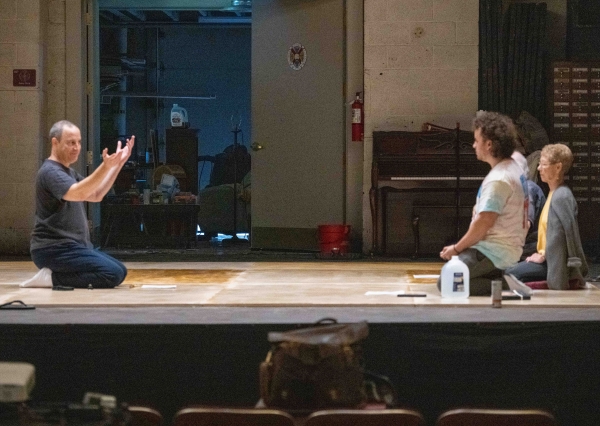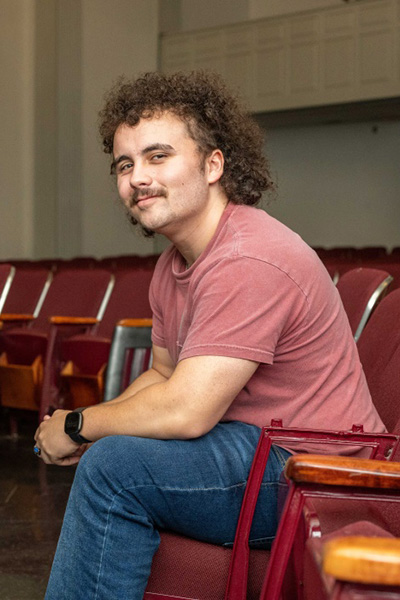Research isn't limited to the sciences. At Hampden-Sydney, students from various disciplines participate in research endeavors. One area that may not come to mind for research but deeply influences how we interpret and engage with art and culture is theatre. This past summer, government and theatre major Evin Burton ’25 immersed himself in theatre research focusing on Noh plays. He took on the roles of performer, scholar, and playwright to explore how Western perspectives influence our perception and understanding of Noh.
Noh is a Japanese theatrical art form that has been around since the 14th century. It encompasses music, dance, and onstage acting. However, it is fundamentally distinct in its aesthetic, themes, and performance techniques, emphasizing subtle and spiritual expression. Noh often explores profound human emotions and philosophical concepts, inviting audiences to reflect on the deeper meanings of life through its unique blend of art and tradition.
“My interest in studying Noh was sparked by Associate Professor of Theatre Matthew Dubroff, who taught my Asian Theatre class in fall 2023 and served as my research advisor,” Burton said. “Through this research, I wanted to deepen my understanding of theatre in an international context and challenge the norms we often associate with the performing arts in the Western world."
Starting with a focus on what it means to be a performer, Evin participated in a three-week program with Dubroff over the summer designed to deepen his understanding of Noh's singing style, performances, instruments, and origins. By the end of the program, Evin had the opportunity to take part in a shortened version of a Noh play, seamlessly integrating the art form's history with its physical performance elements.
“This was a crucial part of the experience,” Evin explained. “Performing in the play Takasago allowed me to understand what it's like to be a Noh performer and link the historical context to a brief performance. Initially, the arrangement of movements felt unfamiliar, but once I applied my theater knowledge, it became a process of reverse engineering—it’s really just staging.”
With an understanding of what it means to be a performer, Evin immersed himself further in the topic. Through the study of various American translated texts, drafted reports, and an exploration of the art form's origins and founders, Evin sought to understand the structure of Noh plays and grasp the differences between Noh and Western theatre, while also examining the emotions evoked by Western interpretations of theatre.

“Through my research, I found that the Western playwriting process is vastly different from Noh,” Evin said. “Noh plays follow the jo-ha-kyū structure, which begins slowly, picks up speed, and ends abruptly, differing from Western playwriting. There are also two main forms of Noh: Mugen Noh, which deals with supernatural themes, and Genzai Noh, which focuses on realistic human stories. A key feature of Noh is the dan, or act, and a play can have several dans within a movement."
To deepen his research, Evin found that Noh is most closely comparable to opera, as both feature multiple stages of movement. This insight helped him better understand the fundamentals, sparking ideas for his own English Noh playwriting process—drawing on a local legend from his hometown and carefully planning key moments, determining when they will occur, and what role they will play in the story.
“One of the main reasons I wanted to major in theatre is because plays are meant to tell important stories—stories that should to be shared,” Evin said. “In the 1930s, my hometown of Texarkana had a serial killer known as the Phantom Killer, who was never caught. I wanted to bring this almost Blockbuster story to a form of Noh, and after learning more about the style of Noh, I realized it could fit perfectly, blending both supernatural and realistic elements.”
“My goal is to inspire people to engage with art in its entirety,” Evin continued. “It's important to recognize the value of performing arts beyond a Western context and to give people the opportunity to experience and understand it. If a student can write about and grasp these forms, it shows that anyone can appreciate and enjoy them as well.”
Passion for your field of study can truly make a difference. Through immersive experiences, detailed research, and thoughtful writing, Evin has been able to dive into the world of Noh theatre, making comparisons to Western traditions that may impact our perceptions of theatre in general.
Evin's dedication has allowed him to gain a deeper understanding not only of theatre but also of the broader connections between cultures. His work exemplifies how passion, combined with thorough research and exploration, can open up new perspectives and enrich the arts by offering insights into different cultures, people, and the world at large.


